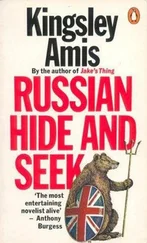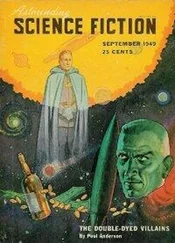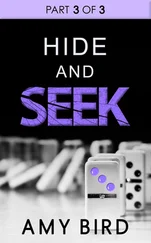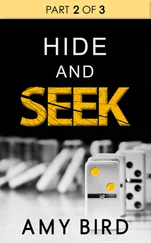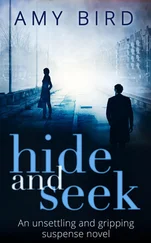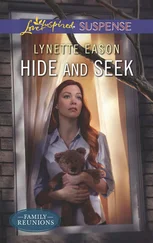Уилки Коллинз - Hide and Seek
Здесь есть возможность читать онлайн «Уилки Коллинз - Hide and Seek» весь текст электронной книги совершенно бесплатно (целиком полную версию без сокращений). В некоторых случаях можно слушать аудио, скачать через торрент в формате fb2 и присутствует краткое содержание. Год выпуска: 2005, Жанр: Классическая проза, на английском языке. Описание произведения, (предисловие) а так же отзывы посетителей доступны на портале библиотеки ЛибКат.
- Название:Hide and Seek
- Автор:
- Жанр:
- Год:2005
- ISBN:нет данных
- Рейтинг книги:5 / 5. Голосов: 1
-
Избранное:Добавить в избранное
- Отзывы:
-
Ваша оценка:
- 100
- 1
- 2
- 3
- 4
- 5
Hide and Seek: краткое содержание, описание и аннотация
Предлагаем к чтению аннотацию, описание, краткое содержание или предисловие (зависит от того, что написал сам автор книги «Hide and Seek»). Если вы не нашли необходимую информацию о книге — напишите в комментариях, мы постараемся отыскать её.
Hide and Seek — читать онлайн бесплатно полную книгу (весь текст) целиком
Ниже представлен текст книги, разбитый по страницам. Система сохранения места последней прочитанной страницы, позволяет с удобством читать онлайн бесплатно книгу «Hide and Seek», без необходимости каждый раз заново искать на чём Вы остановились. Поставьте закладку, и сможете в любой момент перейти на страницу, на которой закончили чтение.
Интервал:
Закладка:
“You needn’t wait, Vance,” said the rector. “Never mind about taking the things away. I’ll ring when you’re wanted.”
Vance gloomily departed.
“Now the young people have left us, Mrs. Peckover,” said Doctor Joyce, turning to the clown’s wife, “there is a good opportunity for my making a proposition to you, on behalf of my old and dear friend here, Mr. Blyth, who, as you must have noticed, feels great sympathy and fondness for your little Mary. But, before I mention this proposal (which I am sure you will receive in the best spirit, however it may surprise you), I should wish—we should all wish, if you have no objection—to hear any particulars you can give us on the subject of this poor child. Do you feel any reluctance to tell us in confidence whatever you know about her?”
“Oh dear no, sir!” exclaimed Mrs. Peckover, very much amazed. “I should be ashamed of myself if I went making any objections to anything you wanted to know about little Mary. But it’s strange to me to be in a beautiful place like this, drinking wine with gentlefolks—and I’m almost afraid—”
“Not afraid, I hope, that you can’t tell us what we are so anxious to know, quite at your ease, and in your own way?” said the rector, pleasantly. “Pray, Mrs. Peckover, believe I am sincere in saying that we meet on equal terms here. I have heard from Mr. Blyth of your motherly kindness to that poor helpless child; and I am indeed proud to take your hand, and happy to see you here, as one who should always be an honored guest in a clergyman’s house—the doer of a good and charitable deed. I have always, I hope, valued the station to which it has pleased God to call me, because it especially offers me the privilege of being the friend of all my fellow-christians, whether richer or poorer, higher or lower in worldly rank, than am myself.”
Mrs. Peckover’s eyes began to fill. She could have worshipped Doctor Joyce at that moment.
“Mr. Blyth!” exclaimed Mrs. Joyce, sharply, before another word could be spoken—“excuse me, Mr. Blyth; but really—”
Valentine was trying to pour out a glass of sherry for Mrs. Peckover. His admiration of the doctor’s last speech, and his extreme anxiety to reassure the clown’s wife, must have interfered with his precision of eye and hand; for one-half of the wine, as he held the decanter, was dropping into the glass, and the other half was dribbling into a little river on the cloth. Mrs. Joyce thought of the walnut-wood table underneath, and felt half distracted as she spoke. Mrs. Peckover, delighted to be of some use, forgot her company manners in an instant, pulled out her red cotton pocket-handkerchief and darted at the spilt sherry. But the rector was even quicker with his napkin. Mrs. Peckover’s cheeks turned the color of her handkerchief as she put it back in her pocket, and sat down again.
“Much obliged—no harm done—much obliged, ma’am,” said Doctor Joyce. “Now, Valentine, if you don’t leave off apologizing, and sit down directly in that arm-chair against the wall, I shall take Mrs. Peckover into my study, and hear everything she has to say, at a private interview. There! we are all comfortable and composed again at last, and ready to be told how little Mary and the good friend who has been like a mother to her first met.”
Thus appealed to, Mrs. Peckover began her narrative; sometimes addressing it to the Doctor, sometimes to Mrs. Joyce, and sometimes to Valentine. From beginning to end, she was only interrupted at rare intervals by a word of encouragement, or sympathy, or surprise, from her audience. Even Mr. Blyth sat most uncharacteristically still and silent; his expression alone showing the varying influences of the story on him, from its strange commencement to its melancholy close.
“It’s better than ten years ago, sir,” began the clown’s wife, speaking first to Doctor Joyce, “since my little Tommy was born; he being now, if you please, at school and costing nothing, through a presentation, as they call it I think, which was given us by a kind patron to my husband. Some time after I had got well over my confinement, I was out one afternoon taking a walk with baby and Jemmy; which last is my husband, ma’am. We were at Bangbury, then, just putting up the circus: it was a fine large neighborhood, and we hoped to do good business there. Jemmy and me and the baby went out into the fields, and enjoyed ourselves very much; it being such nice warm spring weather, though it was March at the time. We came back to Bangbury by the road; and just as we got near the town, we see a young woman sitting on the bank, and holding her baby in her arms, just as I had got my baby in mine.
“‘How dreadful ill and weak she do look, don’t she?’ says Emmy. Before I could say as much as ‘Yes,’ she stares up at us, and asks in a wild voice, though it wasn’t very loud either, if we can tell her the way to Bangbury workhouse. Having pretty sharp eyes of our own, we both of us knew that a workhouse was no fit place for her. Her gown was very dusty, and one of her boots was burst, and her hair was draggled all over her face, and her eyes was sunk in her head, like; but we saw somehow that she was a lady—or, if she wasn’t exactly a lady, that no workhouse was proper for her, at any rate. I stooped down to speak to her; but her baby was crying so dreadful she could hardly hear me. ‘Is the poor thing ill?’ says I. ‘Starving,’ says she, in such a desperate, fierce way, that it gave me a turn. ‘Is that your child?’ says I, a bit frightened about how she’d answer me. ‘Yes,’ she says in quite a new voice, very soft and sorrowful, and bending her face away from me over the child. ‘Then why don’t you suckle it?’ says I. She looks up at me, and then at Jenny and shakes her head, and says nothing. I give my baby to Jemmy to hold, and went and sat down by her. He walked away a little; and I whispered to her again, ‘Why don’t you suckle it?’ and she whispered to me, ‘My milk’s all dried up. I couldn’t wait to hear no more till I’d got her baby at my own breast.
“That was the first time I suckled little Mary, ma’am. She wasn’t a month old then, and oh, so weak and small! such a mite of a baby compared to mine!
“You may be sure, sir, that I asked the young woman lots of questions, while I was sitting side by side with her. She stared at me with a dazed look in her face, seemingly quite stupefied by weariness or grief, or both together. Sometimes she give me an answer and sometimes she wouldn’t. She was very secret. She wouldn’t say where she come from, or who her friends were, or what her name was. She said she should never have name or home or friends again. I just quietly stole a look down at her left hand, and saw that there was no wedding-ring on her finger, and guessed what she meant. ‘Does the father know you are wandering about in this way?’ says I. She flushes up directly; ‘No;’ says she, ‘he doesn’t know where I am. He never had any love for me, and he has no pity for me now. God’s curse on him wherever he goes!’—‘Oh, hush! hush!’ says I, ‘don’t talk like that!’ ‘Why do you ask me questions?’ says she more fiercely than ever. ‘What business have you to ask me questions that make me mad?’ ‘I’ve only got one more to bother you with,’ says I, quite cool; ‘and that is, haven’t you got any money at all with you?’ You see, ma’am, now I’d got her child at my own bosom, I didn’t care for what she said, or fear for what she might do to me. The poor mite of a baby was sure to be a peacemaker between us, sooner or later.
“It turned out she’d got sixpence and a few half-pence—not a farthing more, and too proud to ask help from any one of her friends. I managed to worm out of her that she had run away from home before her confinement, and had gone to some strange place to be confined, where they’d ill-treated and robbed her. She hadn’t long got away from the wretches who’d done it. By the time I’d found out all this, her baby was quite quiet, and ready to go to sleep. I gave it her back. She said nothing, but took and kissed my hand, her lips feeling like burning coals on my flesh. ‘You’re kindly welcome,’ says I, a little flustered at such a queer way of thanking me. ‘Just wait a bit while I speak to my husband.’ Though she’d been and done wrong, I couldn’t for the life of me help pitying her, for her fierce ways. She was so young, and so forlorn and ill, and had such a beautiful face (little Mary’s is the image of it, ‘specially about the eyes), and seemed so like a lady, that it was almost a sin, as I thought, to send her to such a place as a workhouse.
Читать дальшеИнтервал:
Закладка:
Похожие книги на «Hide and Seek»
Представляем Вашему вниманию похожие книги на «Hide and Seek» списком для выбора. Мы отобрали схожую по названию и смыслу литературу в надежде предоставить читателям больше вариантов отыскать новые, интересные, ещё непрочитанные произведения.
Обсуждение, отзывы о книге «Hide and Seek» и просто собственные мнения читателей. Оставьте ваши комментарии, напишите, что Вы думаете о произведении, его смысле или главных героях. Укажите что конкретно понравилось, а что нет, и почему Вы так считаете.


